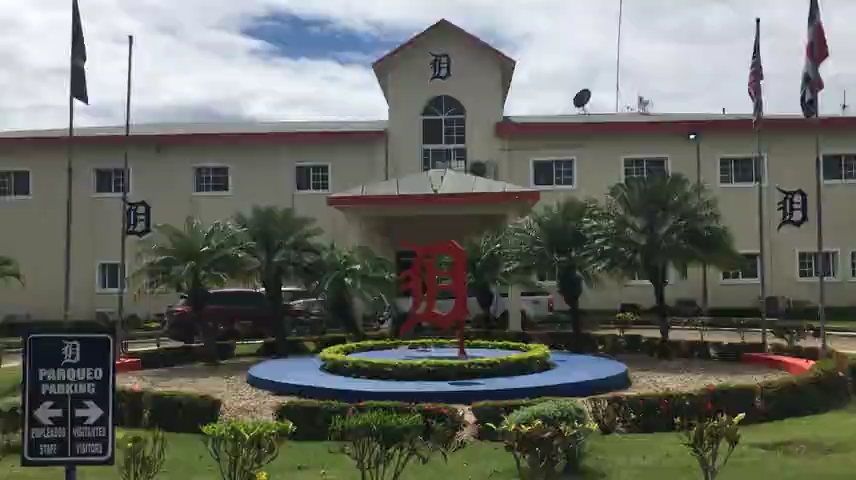| Detroit Free Press

Tour the Detroit Tigers’ Dominican Republic academy
Free Press sports writer Anthony Fenech tours the Detroit Tigers’ Dominican Republic academy in March 2020.
How do the Detroit Tigers decide what international players to sign?
Tom Moore, their director of international operations, says he puts names of prospects on a board, spins around a few times, sticks a pin in the name of a random player and, voila!, a signing.
Of course, Moore is joking.
But the difficulty of discovering international gems can feel like a random process at times, with prospects signing as early as age 16. Teams rely heavily on their scouts to know the player, build a relationship with their trainer and evaluate the program they come from.
“It’s getting to know the player, how they interact with their teammates and, the times that we can, find out where they’re from, get to know the parents, families and support systems,” Moore said Thursday. “That’s a huge part of it.”
Recently, that effort’s difficulty has greatly escalated, thanks to the global COVID-19 pandemic. The pandemic has forced the Tigers to readjust how they operate in the international scouting department.
FOR SUBSCRIBERS: Why Tigers fans should take this crop of prospects seriously
To start with, MLB halted teams’ international scouting in March because of the virus: No tryouts, no games, no showcases, no workouts, no in-home visits and no remote scouting. Then, in June, scouts could collect video and data but in-person scouting remained prohibited,. Accordingly, the start of the international signing period was delayed from July 2. Finally, in mid-September, teams were allowed to resume in-person international scouting.
Still, the international signing period is coming, on Jan. 15. And the Tigers are going to have to trust their instincts — something they focused on refining during the six-month in-person ban — from afar as the virus continues to impact their international industry.
[ Gauging the Tigers’ interest in Yoenis Cespedes’ younger brother ]
“The trainers of these players, they were prepared to have their players sign on or after July 2,” Moore said. “They’ve been champing at the bit to get their players out and signed. As soon as it was safe for their players to start working out again, they were working out, even before we could actually go out and scout them. We were able to keep tabs on those players.”
The Tigers’ academy in San Pedro de Macoris, Dominican Republic, remains closed. Moore’s crew is having a difficult time scouting in Venezuela because of gasoline shortages and the country’s quarantine plan, which shuts everything down every other week. Scouts haven’t been to Australia, Japan or China, either.
While the Tigers’ international scouts will eventually once again spread out across most of baseball’s developmental hotbeds, Moore is concerned about the long-term impact of the unrest in Venezuela.
[ Inside the Detroit Tigers’ Dominican academy, there’s hope for the future ]
“I think it may have an impact on the youth baseball market first,” Moore said. “I’m not sure if we’re looking at this year or next year, (where) we would see a downside in amateur talent. But if things continue the way they are, and they’re more difficult for trainers. It’s a youth baseball system, and that’s what makes Venezuela such a strong baseball market.
“If that all of a sudden gets hurt, and those players are not playing as much at younger ages, then the talent that the trainers are getting as the players get older is not going to be as strong. Therefore, that would take a hit.”
Despite the six-month shutdown and the current challenges, the Tigers’ international scouting department believes it has improved as a unit.
Games in Taiwan and South Korea, where leagues opened well before MLB’s season began, were helpful in filling the void and serving as a refresher course. International and professional scouts cross-referenced their opinions on those players. Latin American scouts watched videos and increased their expertise.
[ Why the Tigers believe 17-year-old prospect Roberto Campos will become a star ]
When there wasn’t much happening, the international scouts gathered over video conferences for in-depth evaluations of the department.
“It was a unique time where we could really look back and reflect about what we do well, what we could improve on,” Moore said. “There’s a lot of individual skill-building. We were able to address philosophies, look at different ways we can improve individually and as a group.”
With limited scouting access, the next step in returning to normal is opening the Dominican academy with an instructional league-style competition, offering games against other opponents and intrasquad scrimmages. Protocols to combat the spread of the virus will be similar to this summer’s alternate training site in Toledo and the team’s domestic instructional league in Lakeland, Florida.
That would allow the Tigers to take a look at 17-year-old outfielder Roberto Campos — who was signed in July 2019 with a $2.85 million bonus — as well as other international prospects who might someday find themselves in Comerica Park.
“He would be part of that, if we’re able to go ahead and have that,” Moore said. “That’s kind of the next step of his process. We’re really excited about what Roberto can start showing on the field once he gets on the field.”
[ Roberto Campos is Detroit Tigers’ next big thing: ‘He’s a dream’ ]
Evan Petzold is a sports reporting intern at the Detroit Free Press. Contact him at epetzold@freepress.com or follow him on Twitter @EvanPetzold.